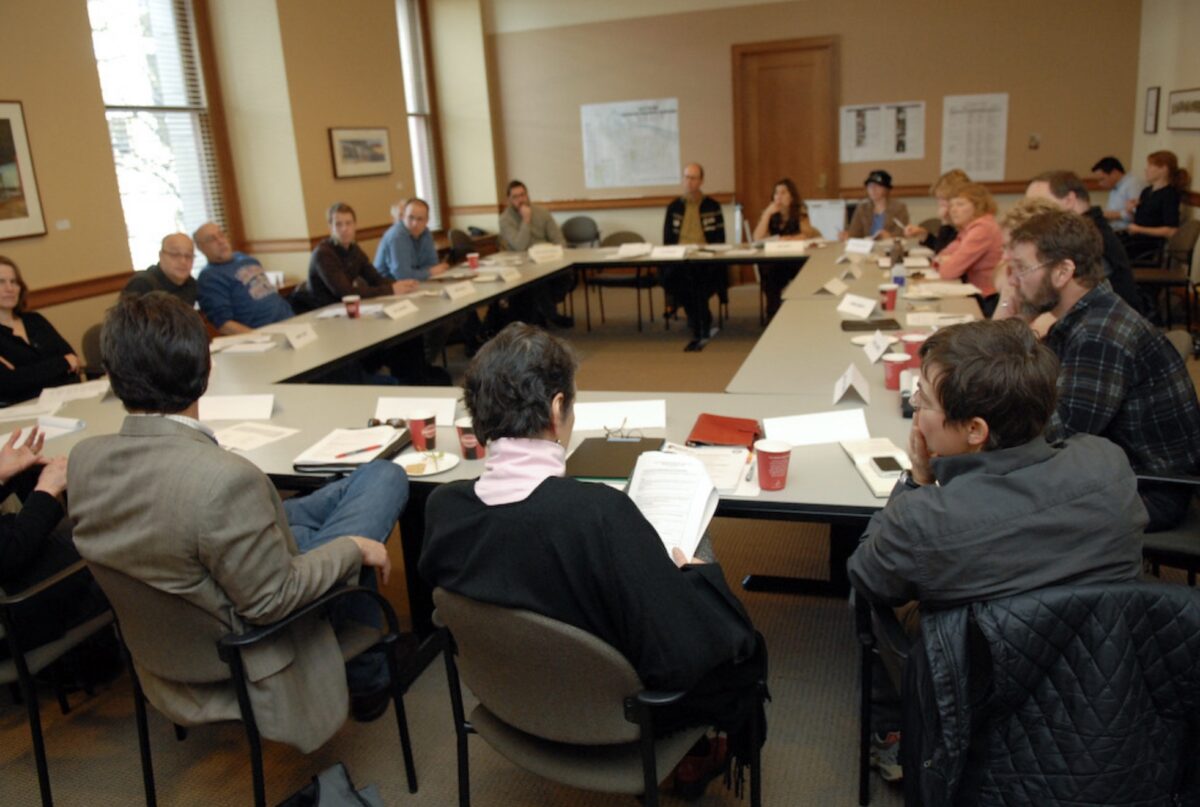Cycling News & Blog Articles
PBOT launches modal advisory committee reform effort

Great committees take work to manage and participate in, but the payoff can be huge.
(Photo: Jonathan Maus/BikePortland)
At long last the Portland Bureau of Transportation has a plan to make their modal advisory committees better and — hopefully — more fair.
There are three main bodies that meet every month to advise and inform PBOT policies and projects. They are the freight, pedestrian and bicycle advisory committees. While they’re set up with a PBOT staff liaison and are ostensibly able to influence decisions on a level playing field, that isn’t always the case. There has been a growing number of concerns from some committee members that they are not respected or listened to enough. And the freight committee in particular has a major unfair advantage when it comes to the ability to influence staff.
We got news of the committee overhaul from a PBOT source last week and then noticed a forthcoming agenda item at the joint bicycle and pedestrian advisory committee scheduled for next week that reads, “Kristin Hull with PBOT will briefly discuss and answer questions about a bureau effort to improve the modal advisory committee system.”
This issue has been building for several years.
Advertisement
Back in 2017 as part of a large-scale reform effort, former commissioner Chloe Eudaly made some big changes at Office of Community & Civic Life, the bureau that oversees the 100+ advisory bodies within the City of Portland. One of those reforms was to strictly enforce term limits to ensure that no member of an advisory body could serve for more than eight years. This led to several veteran members of the Bicycle Advisory Committee being forced to leave against their will.
Term limits are a good thing, but the freight committee hasn’t had to abide by the same rules as the other two committees and as such, retains an unfair advantage and undue influence over PBOT.
The freight committee has been allowed to retain all their members, despite some of them being on it for 14 and even 16 years (the Freight Advisory Committee was established in 2003). In 2020, 15 of the 25 FAC members (60%) had served for over eight years. But when leaders of the committee balked at the term limit rules, Commissioner Eudaly agreed to give them a special exemption to the rules. In a letter dated March 31, 2020, Eudaly gave the freight committee permission to ignore the term limit rule until the city adopts a new Freight Master Plan, a process currently underway.
Another unfair advantage enjoyed by the freight committee is that its members are paid by the corporations they work for to attend the meetings. The pedestrian and bike committees are volunteers who attend meetings in the evenings. The freight committee meets during the business day.
The freight committee is also the least racially diverse of the three committees. And because their members have been allowed to remain, they have no plans for a large-scale recruitment. In a report from PBOT on the city’s 5-Year Racial Equity Plan passed by the Office of Equity & Human Rights in 2016, the bureau said, “Staff expressed concerns that the bureau relied too heavily on its advisory committees, who are generally occupied by white people who sit on multiple committees for extended periods of time, and do not represent the varied interests of the community at large, but rather their own special interests.”
Fixing these long-running problems with the freight committee should be a top priority.
The conversation around committee reform is also likely to include ideas to re-organize them. There’s been talk for years about the bike and ped committees moving into one committee. Others have recently suggested that we have just one committee — and that its powers get bumped up into a commission so it has voting power similar to the Design Commission or the Planning & Sustainability Commission.
And what about scooter riders and other types of micromobility users? Or transit riders? Or even car drivers? None of those groups are currently represented by a PBOT modal committee. Reforms are long overdue!
If you’d like to join this discussion tune into the joint bike and pedestrian committee meeting next Tuesday (5/17) from 6:00 to 8:00 pm. You can learn more and find the Zoom links here.
![]()
Jonathan Maus is BikePortland’s editor, publisher and founder. Contact him at @jonathan_maus on Twitter, via email at This email address is being protected from spambots. You need JavaScript enabled to view it., or phone/text at 503-706-8804. Also, if you read and appreciate this site, please become a supporter.


